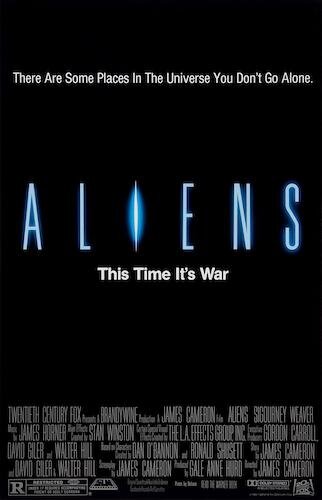Aliens: On-This-Day Thursday
Every Thursday, an older film released on this opening weekend years ago will be reviewed. They can be classics, or simply popular films that happened to be released to the world on the same date.
For July 18th, we are going to have a look at Aliens.
Alien was the last-one-standing film of the ‘70s: a blending of the slasher tropes that were emerging and the philosophical wondering of science fiction. Ridley Scott was a household name, and the story of Ellen Ripley’s narrow survival made its waves. Newcomer Canadian director James Cameron was approached to direct the sequel to Alien after The Terminator felt like the next big thing. Of course, both films are so incredibly different. How would this have worked out? Well, it’s not really a secret if I say that Aliens is a success story for the ages. It’s a sequel that worked really well, which doesn’t happen too often (especially if the original film is as massive as it is). It’s a sequel that’s of a completely different nature: Alien was purely patience testing horror, whereas Aliens was an action ride with some horror elements. Ripley went from lone survivor full of wits into the badass cinematic heroine of all time in the span of two and a half hours (Sigourney Weaver was nominated for her performance: a rarity for science fiction and action films). Aliens shouldn’t have worked as well as it did, but we know over thirty years later that it did a fine job.
Stuffed with Cameron-isms and tropes, Aliens is the macho answer to one’s survival and its rippling effects. Ripley — traumatized — is ignored and considered unreliable enough to toss onto the street. Once her word is actually believed, this becomes Ripley’s mission to change everything. Despite the new approach to the film’s nature, Cameron’s attention to detail cannot go unnoticed, with sufficient callbacks that show growth in Ripley as a person and the franchise’s narrative. Ripley feeling uneasy about working with an android again. Her approaches to specific scenarios from experience. That sort of thing. It’s the glue that keeps both films together, and makes a double billing make even more sense.
“Game over, man. Game over.”
As far as action films from the ‘80s go, Aliens is definitely a top contender for the title outside of other works like Mad Max 2 or Die Hard (although that’s a Christmas film first and foremost to me; joke debate for another time). Does action overtake the plot? Well, only when the film insists it’s time. It’s carefully cautious in that way, so the never ending blood spill and calamity created by circumstance (the cooling system scare was a nice touch, for instance) delivers with complete impact. Then we get the climax which brings everything full circle: a survivor-turned-blue-collar-employee who has suffered loss, donning the role of guardian for an isolated child and in a similar predicament as before. In Alien, she saved her own life. In Aliens, she’s saving the life of another.
It’s the final battle of the ‘80s, and it’s full of slick choreography, vicious emotional power, and complete triumph. Maybe Cameron has surrendered to the blueprints of the action structure in his old age, but these are the blueprints he helped make back in these former years, and Aliens was him operating at his very best ever. Sure, some of the work was cut out for him with Scott’s previous film, but Cameron still made Aliens its own film whilst still being faithfully a sequel, and it’s a risk that doesn’t seem to be able to exist anymore. So, to end things off with the question (Alien or Aliens?), I’ll forever go with Alien, which I consider to be one of the peak moments of cinematic horror ever. However, Aliens is the victory lap: the fun side of the equation. It doesn’t get carried away and lose sight (unlike, say, Alien Resurrection), but it’s the large middle finger to a cinematic baddy (or, in Aliens’ case, multiple baddies) that ruined lovely lives in the first film. Aliens gets pretty serious, but it’s the definitive epilogue to Alien that has just as much to say in its own way. Sadly, the franchise never got remotely good again (even Prometheus and Covenant are just okay), but Aliens is a reminder that cinematic miracles can happen, and blockbuster dares can pay off.
Andreas Babiolakis has a Masters degree in Film and Photography Preservation and Collections Management from Ryerson University, as well as a Bachelors degree in Cinema Studies from York University. His favourite times of year are the Criterion Collection flash sales and the annual Toronto International Film Festival.







